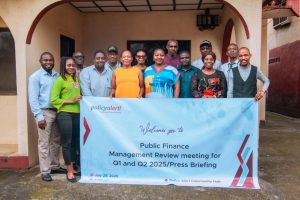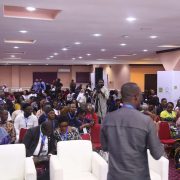How Fiscal Transparency is Eroding in Akwa Ibom State

By Ekemini Simon
The journey towards fiscal transparency in Akwa Ibom State has taken a concerning turn under Governor Umo Eno’s administration. Despite previous strides in public finance management reforms, the Oil-rich State has taken a significant step backward sparking concerns among civil society organisations and citizens.
Under Governor Udom Emmanuel’s administration, Akwa Ibom State made significant progress in public finance management reforms. Although the administration began making progress with the publication of its budget online, some transparency indicators were neglected. But the administration progressed swiftly with the publication of other important documents when in early 2020 the State Fiscal Transparency, Accountability and Sustainability (SFTAS) report of 2018 showed how Akwa Ibom State among other 11 states performed poorly in fiscal transparency.
The reforms later implemented by the administration were driven by the spirited advocacy of civil society organisations in the State and the support of development partners and programmes especially the State Fiscal Transparency, Accountability and Sustainability (SFTAS) Programme in Nigeria- a World Bank-supported initiative.
The administration welcomed and implemented various initiatives, including the online publication of annual budgets, detailed Budget Implementation Reports, Audited Financial Statements, and Citizens’ Budget. These efforts earned the state recognition, including ranking top among six states in the South-South region and fifth in the country on the Budget Transparency Index in 2020.
Shift from Transparency
Regardless of the strides made in the past, the current administration’s publication of incomplete fiscal documents has raised concerns about the erosion of fiscal transparency by the Government of Akwa Ibom State.
Besides the failure to adhere to the timelines provided for in the Akwa Ibom State standard budget calendar on the publication of fiscal documents, the State now publishes incomplete fiscal documents thus having a posture of being transparent but proving false to its requirements.
The culture of incomplete fiscal reports by the administration started raising its ugly head in the 2024 citizens budget with only a cover page document.
It advanced in the First Quarter Budget Implementation Report (BIR) of 2025 with only a 3 page summary provided. Despite the media raising alarm to this strange anomaly, the government waved it off. This ugly development was far from exiting the stage. The State in the Second Quarter BIR of 2025 again published a scanty three (3) page summary, leaving out important parts of the document.
A careful review of the 2025 first and second quarter BIRs across Nigeria’s 36 states reveals that with the exception of Rivers State (which does not publish a BPR under its military rule), and inaccessible reports from Anambra and Plateau, all other states have comprehensive BIRs that include detailed capital project breakdowns, especially in sectors like Education and Health.
What is more, the current BIR for Q2 of 2025, represents a further decline from the quality of previous reports which the civil society and the media have repeatedly pointed out, had problematically omitted details of capital budget line items. Since 2019, Akwa Ibom State has not published a comprehensive capital expenditure report. What is available are partial project-level details for Q1 through Q3 in approved budgets, often excluding the crucial Fourth Quarter data.
What the incomplete Data mean for Citizens
The scanty report implies that the citizens will not have access to key pieces of information required to push for accountability or make necessary recommendations for the government to improve upon in its financial management. The data missing means there are no details/ disaggregation of Revenue by Administrative Classification, i.e Revenue by Administrative Classification generated by individual MDAs.
There are no details / disaggregation of Revenue by Economic Classification, i.e. data on the inflow from sources such as Statutory Allocation, Derivation Funds, VAT share, Excess Crude, Ecological Funds, and others. Additionally, IGR sources like taxes, licenses, royalties, fees, fines, rents, investment income, and interest earned are not disclosed.
There are no details / disaggregation of Expenditure by Administrative Classification, information on how budgeted funds are spent across MDAs, particularly whether key sectors such as Agriculture, Education, Health, and Water Sanitation and Hygiene (WASH) are prioritized over administrative MDAs like Government House, SSG Office, or the House of Assembly.
There are no details / disaggregation of Expenditure by Programme/Functional Classification, i.e information on spending categorized according to the purposes and objectives for which they are intended e.g.Public Debt, environmental protection, among others.
Government’s Defense
The Government of Akwa Ibom State has defended the approach by the administration, stating that they publish what is “adequate enough” for citizens.
The Akwa Ibom State Commissioner for Budget and Economic Planning, Mr. Linus Nkan while fielding questions on the noticeable gaps during the Q2 BIR presentation said that the presentation is enough to get everyone to know the essentials of accountability of the government, which is how much has been collected on behalf of the government.
He said “We publish what is important and we leave out what is not important. If we are talking to the whole Akwa Ibom people that put this government in place, the presentation is enough to get everyone to know the essentials of accountability of the government; which is how much have you collected on behalf of the government? For me, that information is enough.
“That you paid Mr. A and failed to pay Mr. B, for me, that information is not important. In the course of the year, there may be little posting errors and at the end of the year, the Auditors will do their work. Where there was wrong classification, posting or coding, that will be corrected. At the end of the year, after our account has been audited by the Auditor General of the State and approved by the House of Assembly, the full publication will be made public. But for this report, we see that it is adequate enough.”
The defense by the government has been found questionable. The Commissioner failed to explain why the Umo Eno’s administration suddenly sees the three-page summary of the report as the only information that is enough for the citizens despite the fact that the past administration had published other details and the administration of Governor Umo Eno had continued publishing the details averaging 46 pages right to the fourth quarter of 2024. He also did not offer insight into the reason the State was not aligning with the detailed BIR template as published by 32 States of the Federation.
Civil Society’s Concerns
Civil society organisations in Akwa Ibom State have expressed concerns about the government’s lack of transparency.
In a press statement signed by Policy Alert, Peace Point Development Foundation ( PPDF) Clement Isong Foundation (CIF), Steps To Sustainable Transformation and Empowerment Foundation(STEPS) and 17 other organizations on Tuesday, July 29, 2025 after its public finance management review meeting, they noted that the failure of the Akwa Ibom Government to provide comprehensive financial data constitutes a clear breach of the Akwa Ibom State Fiscal Responsibility Law (2020), specifically Section 48(1) which mandates that the State conduct its fiscal and financial affairs transparently, ensuring “full and timely disclosure” of all transactions involving public revenues and expenditures.

The organisations stated that the current opaque reporting undermines legal obligation, erodes public trust, and limits citizens’ capacity to link budget implementation to key priorities under the government’s avowed policy direction, the ARISE Agenda.
Explaining that they have also noticed a disturbing trend in public procurement in the state which is in clear violation of the Akwa Ibom State Public Procurement Law 2019, they highlighted what they have noted to include; details regarding total project costs, timelines, and specifications not often disclosed, the current practice of the Executive Council approving contracts based on memos from the Finance and General Purpose Committee (FGPC) thus raising questions about oversight and breach of the Akwa Ibom State Public Procurement Law (2019) which stipulates that procurement processes must be conducted transparently, with oversight by the Bureau of Public Procurement.
How A’Ibom Govt can Halt the Slide- CSOs
To restore sanity to the Akwa Ibom State fiscal space, the civil society groups called on the Government of Akwa Ibom State Government to recall the recently released Q2 2025 Budget Implementation Report and immediately publish a comprehensive, detailed, and accessible BIR for Q2 2025.
They asked the State Government to publish historical Budget Implementation Reports that have omitted key details of revenue and expenditure in the State and comply fully with legal requirements on transparency and procurement in line with extant laws in the state.
The organisations called on the Umo Eno’s administration to reconstitute the Public Procurement Council and empower the Bureau of Public Procurement fully, establish a Procurement Council in line with legal provisions, and adhere to principles of open, competitive and transparent bidding in all public procurement activities and reinstate the e-procurement portal for key sectors, including health, education, Water, Sanitation and Hygiene (WASH), and infrastructure/public works.







